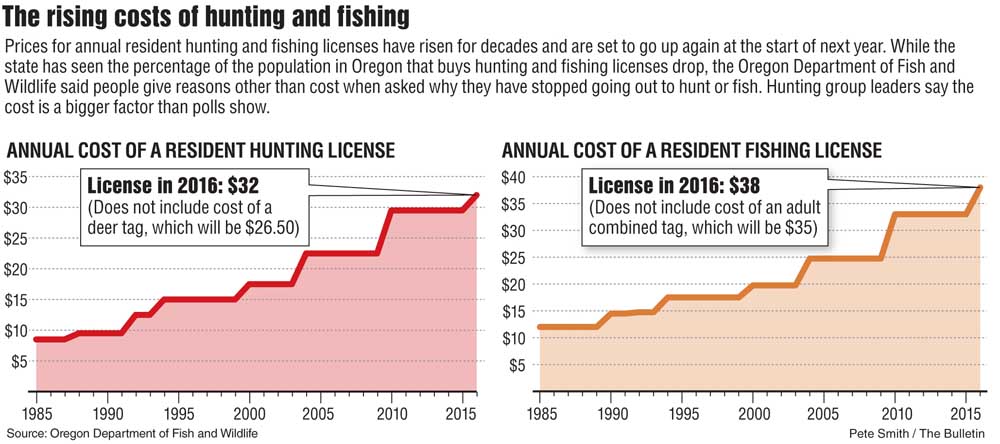Costs of Oregon hunting, fishing licenses keep climbing
Published 12:00 am Sunday, October 25, 2015

- Costs of Oregon hunting, fishing licenses keep climbing
Hunting and fishing license costs in Oregon are steadily going up, starting next year and continuing every other year until 2020.
An annual hunting license for an Oregon resident, which costs $29.50 this year, will increase to $32 next year, $33.50 in 2018 and $34.50 in 2020. An annual state resident fishing license, which costs $33 this year, will cost $38 next year, $41 in 2018 and $44 in 2020.
Trending
Increases in the license costs are not new, but the frequency of the price bumps and the smaller size of the increases are, according to Oregon Department of Fish and Wildlife Service data. Since 2004 the cost of annual hunting and fishing licenses for residents has increased every six years, said Aaron Jenkins, economist with the agency in Salem. Gov. Kate Brown this summer signed a bill setting the gradual price increases, he said.
“We would like the fees to edge up slowly rather than have a big jump,” Jenkins said. “People don’t like big jumps in prices.”
Compared with California, where resident hunting and fishing licenses cost $47.01 apiece, Oregon’s prices seems small. But in contrast, a combined resident hunting and fishing license in Idaho costs $33.50.
Since the late 1970s, the Oregon Department of Fish and Wildlife has seen a decline in the percentage of Oregon resident hunting and fishing license sales. Forty years ago, in 1975, 18.9 percent of Oregon’s 1.7 million residents age 12 to 69 bought a hunting license and 34.6 percent of the 1.6 million residents age 14 to 69 had a fishing license. Numbers from 2013 showed a drop to 8.3 percent of Oregon’s 2.9 million residents age 12 to 69 who purchased a hunting license and 17.4 percent of the state’s 2.8 million residents age 14 to 69 who bought fishing licenses.
Some hunters and anglers say the drop in the percentages could be linked to the rising license costs. KC Thrasher , president of the Redmond chapter of the Oregon Hunters Association, said he started hunting when he was 13. Ever since, he has seen license costs rise, and he’s 33 now. “There has been quite the increase,” he said.
In 1975, an annual resident hunting license cost $5 and a fishing license cost $6, according to Fish and Wildlife data.
Trending
The cost of an annual resident hunting license and fishing license have increased eight times since then.
The agency relies in part on license fees for funding, Jenkins said. By increasing fees, he said the department tries to keep up with inflation and expenses.
“The cost of doing business is always edging up,” he said.
Although the price of hunting and fishing licenses may have stopped some people from buying them, other reasons for the decline have been more prominent in surveys , said Michelle Dennehy, spokeswoman for Fish and Wildlife in Salem.
A 2008 report by Responsive Management, a public opinion polling company, and the National Shooting Sports Foundation showed the top reasons cited by people who have stopped hunting : amount of free time, family and work obligations. Costs of licenses came in 16th .
But Thrasher and his counterpart in Bend, Bill Littlefield, both consider license cost to be a bigger issue than the poll showed. Cost could be a factor when people weigh whether to go hunting or fishing versus spend time with their family or take a vacation from work. Littlefield is the Bend chapter president of the Oregon Hunters Association.
Like Thrasher, Littlefield said he has seen license costs go up significantly. He said other reasons why people lose interest in hunting include kids spending more time playing team sports and more folks living in cities rather than the country.
“And, just society doesn’t value it like it used to,” Littlefield said.
— Reporter: 541-617-7812,
ddarling@bendbulletin.com








